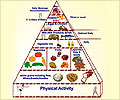How to Overcome Negative Thinking and Thought Patterns
"If you have a bad thought about yourself, tell it to go to hell because that is exactly where it came from" - Brigham Young
The lens through which you view the world is predominately determined by your thoughts, whether you like it or not. For this reason, it is important to examine the nature of your thoughts. Are they generally more positive than negative? Do they form the groundwork for an optimistic attitude or a pessimistic attitude?
Both your biology and your environment help answer these questions. The nature versus nurture dichotomy has been debated upon for centuries but many believe the two to be entangled. In other words, you are bound to be influenced by your genetic makeup as well as your environmental surroundings, which include your formative years, your upbringing and your peers. Hence the thoughts that emanate from within to a large extent depend on these layers that have slowly made you what you are and this is more complex than we realize and understand.
Negative Thinking
Negative thinking is a form of thinking that leads to various negative consequences. It is based on false beliefs or on a few selective facts, and it disregards important facts that would lead to better consequences. Negative thinking is rigid, absolute, and not supported by most of the facts.It is hard to recognize negative thinking. You may only recognize that your life is not working.
You cannot possibly always control what you think, but you can learn to identify when you#$#re sinking into a negative pattern and then reboot and redirect your thinking towards a more constructive or hopeful path. If you keep redirecting your negative thinking over months and years, you may even change the patterns of neural connections in your brain so that you react to life#$#s events in more grounded ways and with less panic and judgment.
These are some of the common patterns of negative thinking
- All-or-Nothing form of Thinking: Thinking in terms of black or white or in just extremes
- Focusing on only the Negatives: Concluding without any reason that one unpleasant experience will lead another negative future with many more hostile experiences
- Cynical Hostility: Believing that how you want to feel accurately represents the truth of your reality
-
Negative Rumination: Perpetually focusing on negative outcomes, leading to feelings of being stuck,
anxious and even depressed - Overthinking: Trying to think of and plan for every possible scenario, attempting to control all that is not on your control to avoid pain or failure
- Magnification of occurrences: Exaggerating negative details of an event and overemphasizing your own imperfections and fears, converting a situation into a much bigger deal than they actually are
- Should Statements: Using #$#should#$# statements to motivate/monitory our behavior when they ultimately leave you feeling pressured and frustrated.
We all have a negative and positive thought and the problem is not that we have negative thoughts, but it becomes a problem when we start believing that these negative thoughts are true.
When you are no longer woven in thoughts they tend to lose their grip on you and then lose their power to generate unpleasant emotions such as anxious thoughts,






